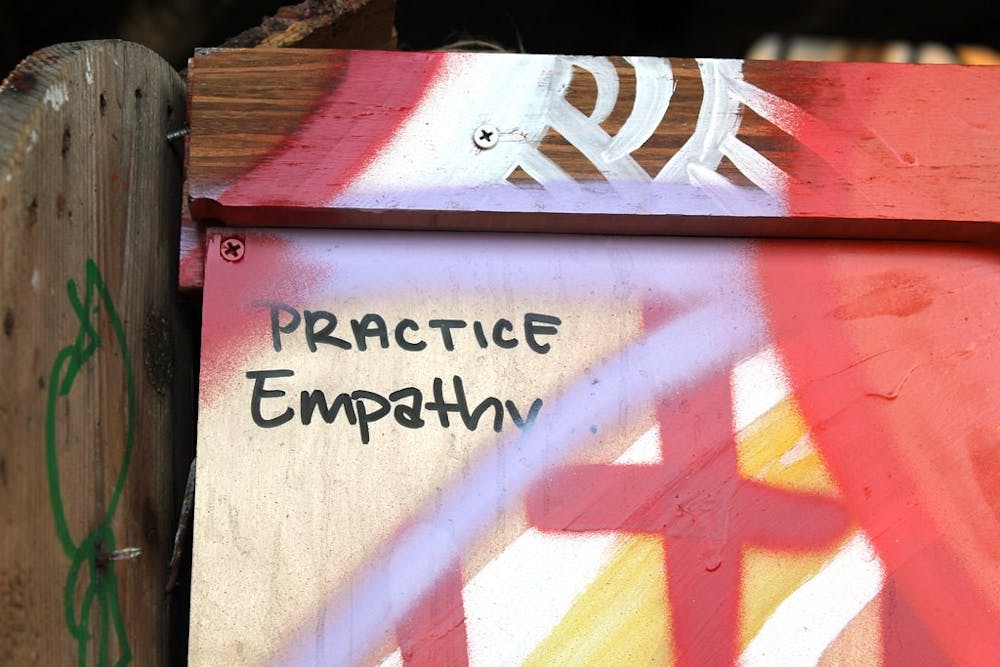Over the last few weeks many of us have seen significant parts of our lives upended as a result of the COVID-19 pandemic. Looking forward, some of our peers have lost internships, but regardless of summer plans, the cancellation of a normal semester has hit us all quite hard. We can all attest to the fact that this transition can be quite difficult to manage. This disruption disturbs our life plans and expectations and can have detrimental effects on our well-being. The pain resulting from this disruption means that we need to exercise our capacities for empathy and understanding.
The horrors of this crisis have created far greater consequences than the ones I have listed. The global death toll has passed 150,000 people, and over 2.3 million people have been infected. Moreover, people who work in essential businesses are putting their health and lives at risk daily so that they can aid their communities and put food on the table.
Certainly, many of us are fortunate to only have to go home and readjust to a new normal. It might seem unnecessary to complain if that is your experience. Certainly, when we compare these troubles to the cost of life that this pandemic has wreaked on the planet, it seems our complaints are trivial. To some, it might seem that this should be something we just get over. However, this response notably lacks empathy and a nuanced view of what going home means.
Some of our peers are fortunate enough to be able to return to stable situations, homes with good Internet access, and places where everyone can stay home without losing their incomes. Some of our peers are not. Given this disparity, it’s not clear that the disruption to our lives is simply something we should get over.
Moreover, no matter the living circumstances of individual students, the disruption itself can be inherently harmful. The centrality of our life plans to our identities and overall well-being can mean that the experiences many of us have had in leaving campus prove to be painful. For many of us, there is a direct relationship between our life plans and our well-being. Specifically, our well-being depends in part on our ability to accomplish the things that we set out to do.
All of us had certain goals and expectations for the rest of the semester and the rest of the year. These were goals that we had set as part of a larger idea of how we wanted our lives to go. When these goals can no longer be met, we can legitimately say that we have been made worse off. Our overall well-being has decreased. This, it seems to me, is a legitimate reason for complaint.
Of course, no one can guarantee that they will accomplish their goals. But the pandemic has exposed an equally obvious truth: we all set reasonable expectations for how our life will go. Moreover, we often work hard to meet those expectations. This pandemic has prevented us from even being able to attempt to meet those expectations. It is a significant loss and one that should be taken seriously.
Take two examples. The first is that of internships, as I’ve already hinted at above. For many, an internship might mean the difference between a fulfilling career after college and a career that simply pays the bills. In cases like these, the cancellation of an internship might prove to be an obstacle for the fulfillment of that particular goal.
The second is one that many of my friends and I have experienced: the cancellation of our senior spring. Now, this one is arguably less consequential. Nonetheless, many of us had short-term life plans built around enjoying the (in)famous post-thesis life. The cancellation of our senior spring has obviously made the fulfillment of those particular plans impossible.
All of this is to say something that should be quite obvious, but might not be at the forefront of everyone’s minds: we ought to have empathy for our classmates and for all the other students around the country who are going through similar experiences. The disruption of life plans — short-term, long-term, and everything in between — can be painful and harmful in its own way. We should not minimize the pain that students are going through right now. Such reductions in well-being ought to be recognized for what they are.
Sebastian Quiroz is a senior from Deltona, FL. He can be reached at squiroz@princeton.edu.









